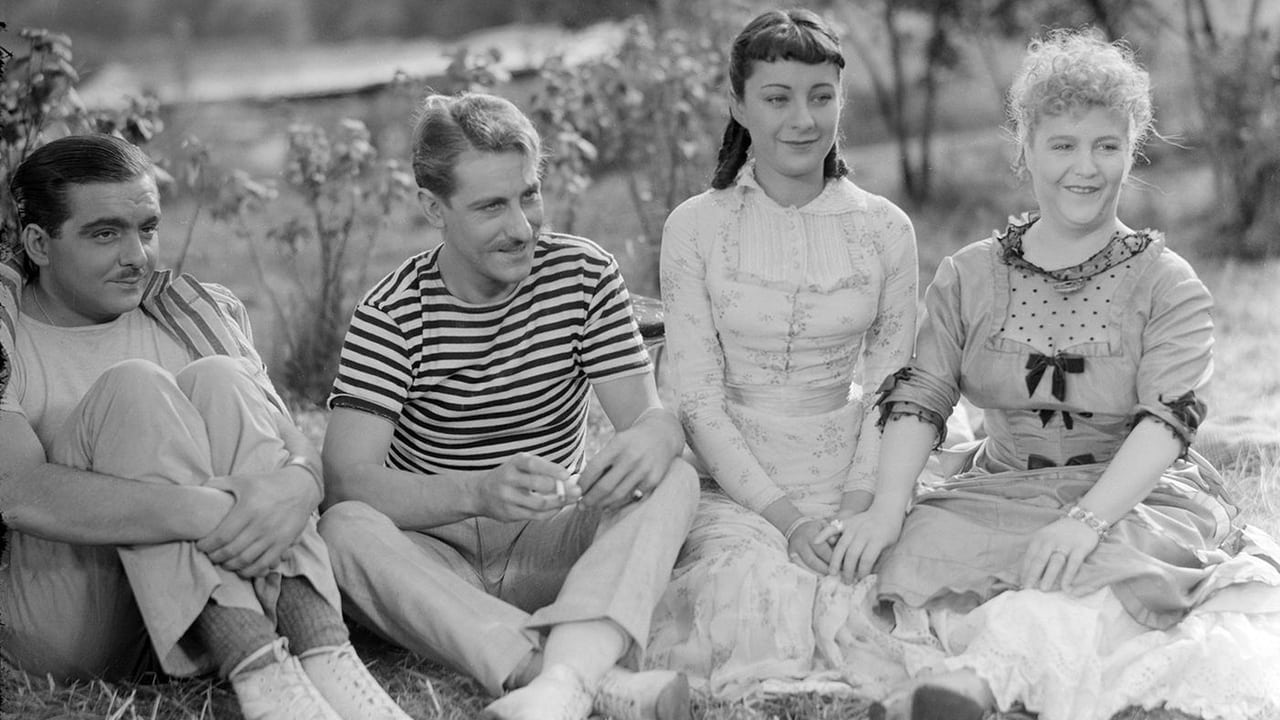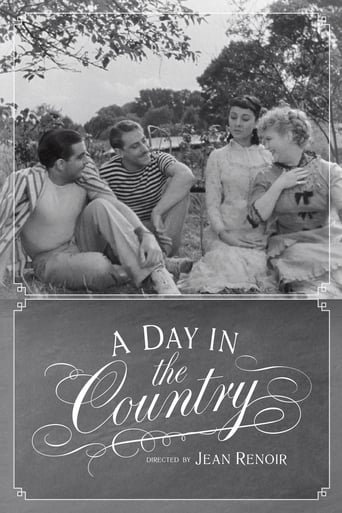SpuffyWeb
Sadly Over-hyped
Softwing
Most undeservingly overhyped movie of all time??
Nicole
I enjoyed watching this film and would recommend other to give it a try , (as I am) but this movie, although enjoyable to watch due to the better than average acting fails to add anything new to its storyline that is all too familiar to these types of movies.
Darin
One of the film's great tricks is that, for a time, you think it will go down a rabbit hole of unrealistic glorification.
framptonhollis
Unfortunately, A Day in the Country is an incomplete film that is only approximately forty minutes long. If things had gone differently, I believe that the film would now be considered Jean Renoir's masterpiece, because within these mere fragments of a work intended to be much larger, one can see a work of genius and beauty. The characters are memorable, the music is heartfelt, the cinematography is gorgeous, and the story is marvelous. Although The River is often praised for its stunning imagery, A Day in the Country may just be the most visually appealing of Renoir's work. His lens captures the countryside with true poeticism, consuming the viewer with its gentle beauty.Across his countryside landscape, Jean Renoir paints a portrait that combines laughter with tears. Beginning as a lighthearted farce, A Day in the Country eventually morphs into a poetic drama and romantic tragedy. The final sequence is the most notable, for it is among the most powerful and unexpected uses of flashing forward in time in cinematic history. Although its full intended impact cannot be felt due to the film's length running short, there is no denying how wonderfully crafted the final scene is within itself. Even without context, one cannot help but choke up a little when witnessing such sadness.Dipped in tenderness and humor, A Day in the Country is an elegant work of art that is sadly short in length, but remains just as powerful as films three times as long despite these unfortunate circumstances.
dlee2012
Une Partie de Campagne is a fascinating early film by Jean Renoir that already demonstrates his masterful cinematography. The outdoor scenes are superbly shot and feel very modern, even when watched in the twenty-first century.Based on a short story by Maupassant the film has a typically French light touch, even when dealing with serious subject matter.The main problem with this film is the casting. As others have noted, both the father and the fiancé are depicted as comic fools and this jars against the style of the rest of the film. The fiancé, in particularly, is constantly mocked in an attempt to justify Henriette's affair with the (slightly) more sympathetic of the two seducers.Henriette herself is also miscast. Played by Sylvie Bataille (later notorious for marrying the fringe psycho-analyst Jacques Lacan) she is a very wooden actress and lacks the charm and innocence needed for the role.What will concern some is that the film is morally subversive in that the seducers are portrayed in a largely positive light and hints that Henriette did the right thing, given how her fiancé turns out. In fact, its morals are the inverse of those found in so many didactic novels of the 19th Century, despite being based on a story written in that time period.Though some complain about the film's short length and there is much conjecture about how unfinished it is, it is satisfying in that it conveys the story efficiently and ends on a believable note.To summarise, less buffoonery from the two male family members and a much better actress than Bataille as the lead would have been needed to lifted this film to the level of a classic. Therefore, ultimately, this film cannot be considered essential for art-house fans and Renoir himself would go on to do much better things. However one can witness the genesis of his style here and revel in the beauty of the countryside in his cinematography and also the wonderfully French light touch on display.
ackstasis
Last week I watched Jean Renoir's 'The Rules of the Game (1939)' for the first time, and, while I quite enjoyed it, I felt rather distanced from the story, as though the film was so preoccupied with snappy characters and dialogue (as in a stage play) that it didn't bother with emotion or atmosphere, the evocation of time and place. Happily, this wasn't a problem with 'Partie de campagne / A Day in the Country (1936).' Renoir's unfinished adaptation of a short story by Guy de Maupassant gains a wonderful personality through its on-location filming. Even though we ourselves never observe the oppressive, polluted Parisian streets, Claude Renoir's outdoor photography sweeps over us with the cool and cleansing touch of a fresh breeze, somehow translating into visuals the revitalising sensation of clean country air in one's lungs. Unfortunately, it was also this on-location shooting schedule that proved the film's demise, weather problems delaying and eventually leading to abandonment of production. The film was not released until 1946, faithfully edited together using the existing footage.Renoir's film undoubtedly feels like an unfinished work, but what exists is nonetheless brilliant. Unlike many unfinished or studio-butchered would-be masterpieces, that 'A Day in the Country' was not completed to the director's satisfaction causes minimal detriment to the sequences that remain today. The narrative up until the "ending" is perfectly-structured and enjoyable to watch, all planned sequences up until this point having presumably been filmed without incident. However, after Henri (Georges D'Arnoux) and Henriette (Sylvia Bataille) come together for the first time in a reluctant but passionate embrace, the story then jarringly cuts to a years-later epilogue, a wistful conclusion that reflects on events that seemingly never took place. "Every night I remember," confesses Henriette, as she meets her former one-time lover, having settled on marrying a scruffy imbecile (Paul Temps). But exactly what does she remember? There had been nothing in the film to suggest that she and Henri had fallen in love; this eventuality had always been implied, but never satisfactorily executed.A strong cast – including André Gabriello, Jane Marken, Jacques B. Brunius and Renoir himself – bring lighthearted humour to their respective roles, but it is the budding romance (never quite realised) between D'Arnoux and Bataille that form's the story's heart. Following its eventual 1946 release, 'A Day in the Country' was lauded as an "unfinished masterpiece," and I suppose that such a description is appropriate. Had filming been completed, such that the story followed through its intended and logical arc, I can only imagine what a powerful piece of cinema the film might have been. Have you ever had a wonderful dream from which you were woken prematurely? This is how I feel about 'A Day in the Country.' Everything up until the hasty ending is funny, emotional, glorious, and invigorating, yet we're wrenched from the dream-like clasp of Renoir's hand unexpectedly and disappointingly. But I'm an optimist: we should simply be glad that this much of the film exists for us to enjoy. Reflecting on what might have been is a task that should ideally be left to movie characters.
sjs257
There are rare and fleeting moments in film history when one is suddenly given a glimpse of the specific beauty of the medium. This sort of ephemeral beauty can only be expressed by the marriage of temporal and spacial (and some may include auditory) elements that is singular to film. One such moment is the storm sequence in "Une partie de campagne." I saw this film once, several years ago, and yet the haunting poetry of that scene still sticks in my mind vividly. Combined with the intense love scene which precedes it, and its contrast to the overall frivolity of the narrative, makes it the most beautiful film of one of film's greatest directors. If you get the chance to see it, its well worth your 40 minutes.

